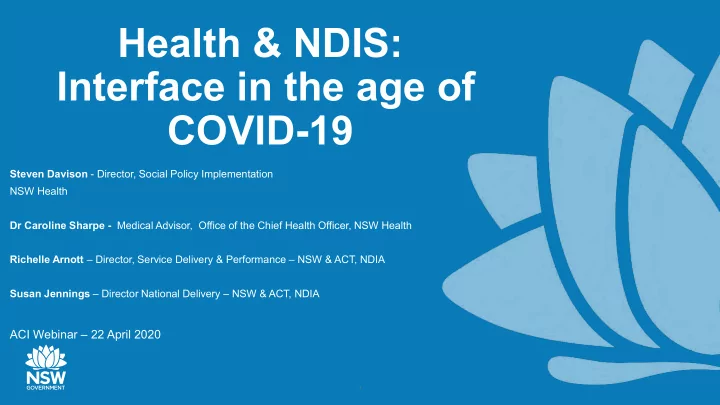

Health & NDIS: Interface in the age of COVID-19 Steven Davison - Director, Social Policy Implementation NSW Health Dr Caroline Sharpe - Medical Advisor, Office of the Chief Health Officer, NSW Health Richelle Arnott – Director, Service Delivery & Performance – NSW & ACT, NDIA Susan Jennings – Director National Delivery – NSW & ACT, NDIA ACI Webinar – 22 April 2020 1
Update on Disability Resources The Department of Social Services (DSS) has published Easy Read resources for people with disability and their • supporters about COVID-19 on their website - https://www.dss.gov.au/disability-and-carers/information-and-referrals- for-people-with-disability-and-their-supporters-about-coronavirus-covid-19 DSS have also established the Disability Information Helpline which provides information and referrals for people with • disability, carers, support staff and service providers who need help because of coronavirus (COVID-19) – 1800 643 787 People with Disability Australia have established a COVID-19 Hub that provides information and resources - • https://pwd.org.au/covid-19-hub/ The World Health Organization (WHO) has published a policy document called Disability considerations during the • COVID-19 outbreak - https://www.who.int/who-documents-detail/disability-considerations-during-the-covid-19- outbreak 2
Telehealth and People with Disability • To provide continued access to essential primary health services during the COVID-19 pandemic, the Commonwealth Government is expanding Medicare-subsidised telehealth services for all Australians. • The Commonwealth is also providing extra incentives to general practitioners and other health practitioners. A factsheet is available via the Department of Health website – https://www.health.gov.au/sites/default/files/documents/2020/04/covid-19-national-health-plan-primary- care-package-mbs-telehealth-services-and-increased-practice-incentive-payments-covid-19-national- health-plan-primary-care-package-mbs-telehealth-services-and-increased-practice-incenti_0.pdf • Telehealth is available to people with disability in the same way as it is available to all Australians. • When providing a service using telehealth, with agreement from the participant, providers can submit payment requests using the support line items that they would normally use to provide face-to-face services. This includes for assessments, reviews and participant education - https://www.ndis.gov.au/coronavirus/providers- coronavirus-covid-19/connecting-and-helping-participants 3
Access to Assistive Technology (AT) by NDIS Participants • Participants who require it will have funding for AT included in their plan based on reasonable and necessary guidelines. Supports costing up to: o $1500 - do not require prescription and can be purchased directly by the participant. The NDIA website states that “low cost, low risk AT under $1,500 could be purchased without further assessment, quotes or approvals once approved as reasonable and necessary in a participant’s plan” ( https://www.ndis.gov.au/news/1657-simpler-process-improve-ndis-assistive-technology) o $5000 - require an OT prescription but no lengthy report or quote. • If AT is required and not already in a participant’s plan, then a light touch review can be arranged by contacting the NDIA on 1800 800 110 and requesting same. 4
Access to Assistive Technology (AT) by NDIS Participants • The Commonwealth Department of Health has stated that “… Measures such as phone or video calls must be accessible to all residents to enable more regular communication with family members. Family and friends should be encouraged to maintain contact with residents by phone and other social communication apps, as appropriate.” ( https://www.health.gov.au/news/australian-health- protection-principal-committee-ahppc-coronavirus-covid-19-statement-on-17-march-2020-0). • Participants have the flexibility to use their funding as they wish . If, in the current crisis, a participant is now accessing services online, then purchase of AT would - prima facie - be reasonable . Services that may now be delivered online instead of face-to-face include telehealth consultations, OT services, instruction on exercise or training, virtual day programs, behaviour management support, social and community participation etc. 5
Personal Protective Equipment (PPE) – how and when to use • The NSW Health Clinical Excellence Commission has posted new PPE training videos - http://www.cec.health.nsw.gov.au/keep-patients-safe/COVID-19/Personal-Protective-Equipment- PPE/covid-19-training-videos • The Australian Health Protection Principal Committee (AHPPC) has endorsed the following recommendations for (non-inpatient) care of people at risk of, or with suspected or confirmed, COVID-19 including the use of personal protective equipment (PPE) - https://www.health.gov.au/sites/default/files/documents/2020/04/revised-advice-on-non-inpatient-care- of-people-with-suspected-or-confirmed-covid-19-including-use-of-personal-protective-equipment-ppe- interim-advice-on-non-inpatient-care-of-persons-with-suspected-or-confirmed-coronavirus.pdf 6
Personal Protective Equipment (PPE) - the National Medical Stockpile If NDIS service providers or self-managing participants need access to PPE, the NDIS Quality and Safeguards Commission factsheet is • advising them to email the National Medical Stockpile at NDISCOVIDPPE@health.gov.au. The NDIA has advised (https://www.ndis.gov.au/coronavirus/providers-coronavirus-covid-19/connecting-and-helping-participants) • that the Commonwealth Department of Health will be triaging requests. Providers will need to demonstrate: They have not been able to source masks on the open market • Existing stocks have been depleted • Who will be using the masks • How masks will be prioritised and distributed to minimise transmission • How previous stockpile supplies (if applicable) have been used efficiently and effectively. • Requests will be prioritised where: • the participant has a confirmed or suspected case of COVID-19 • safe care cannot be provided without PPE; or • where there is a clinical need. • 7
NDIS FAQs The NDIA has a Q&A page for providers that now provides additional helpful information about practical issues associated with service delivery during the COVID-19 response. https://www.ndis.gov.au/coronavirus/participants-coronavirus-covid-19/support-workers-and-you • 8
Contacts National Coronavirus Helpline • If you are sick and think you have symptoms of COVID-19, seek medical advice. If you want to talk to someone about your • symptoms, call the National Coronavirus Helpline for advice. The line operates 24 hours a day, seven days a week - 1800 020 080. Medical assistance • You can access other medical assistance from your GP or hospital emergency department (ED) or by calling healthdirect on 1800 • 022 222 or visit at https://www.healthdirect.gov.au/. If you have a medical emergency call 000. • NSW Ministry of Health • Email questions to the MOH-NDIS Inbox - MOH-NDIS@health.nsw.gov.au. • NDIA • Phone 1800 800 110 , contact your Local Area Coordinator or visit https://www.ndis.gov.au/coronavirus. • NDIS Quality and Safeguards Commission • Phone 1800 035 544 or visit the website at https://www.ndiscommission.gov.au/. • 9
Recommend
More recommend